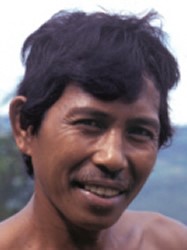Ranau in Indonesia

Photo Source:
Copyrighted © 2026
Anonymous All rights reserved. Used with permission |
Send Joshua Project a map of this people group.
|
| People Name: | Ranau |
| Country: | Indonesia |
| 10/40 Window: | Yes |
| Population: | 71,000 |
| World Population: | 71,000 |
| Primary Language: | Lampung Api |
| Primary Religion: | Islam |
| Christian Adherents: | 0.05 % |
| Evangelicals: | 0.03 % |
| Scripture: | New Testament |
| Ministry Resources: | Yes |
| Jesus Film: | Yes |
| Audio Recordings: | Yes |
| People Cluster: | Lampung of Sumatra |
| Affinity Bloc: | Malay Peoples |
| Progress Level: |
|
Introduction / History
The Ranau are a group who live near Lake Ranau in South Sumatra. The Ranau live in a few villages in South Ogan Komering Ulu regency, in Banding Agung subdistrict. In their area, the Ranau live near Javanese, Daya, Komering and a few Chinese people who have lived in the area for several generations and mixed with the rest of the population. Linguistically, the Ranau speak a dialect of the Lampung Api language. They are able to understand the Komering, Daya and some other related languages. Ethnically, however, they identify with the Lampung Pesisir people but not with the Daya or Komering people. Some Ranau people are also able to speak the Palembang trade language well.
What Are Their Lives Like?
The Ranau people live in a beautiful mountain area made even more beautiful by their large lake. The name Ranau comes from the local word for "lake", which then became the name for the people living around the lake. The lake is the center of the area. About once every year liquid sulfur comes out of the center of the lake bottom, causing many of the fish to become sick or die. There is a hot spring on one of the shores of the lake. The lake has been made into a tourist destination by the government. There is an unmaintained airfield nearby. There are also several motels in the area. The Ranau area is very fertile and the large tracts of forest help the area maintain a natural feeling. The primary means of income among the Ranau is growing coffee and tobacco. There are many coffee plantations spread across the area. Coffee is the chief agricultural commodity for the people in the highlands of South Sumatra. The Ranau often carry a keris (small knife), reflected by the proverb "your weapon is your clothing". Keris is also called "dengasanak" which means older brother who protects. In a Ranau wedding, a keris is placed on a tray and is given by the groom to the bride, as a sign of his oath to protect her with all his strength.
What Are Their Beliefs?
Due to the influence of other people groups in South Sumatra, most of the Ranau are Muslim. However, their form of Islam is more a tradition passed down through the family rather than based on personal belief. As a result, it's not strange to find many people who believe in superstitions and sacred objects and places, or who still practice magic arts. According to their beliefs, the number of children in a home needs to be an odd number to bring blessing to the home. Islam in Ranau is part of the Nahdatul Ulama group (Association of Muslim Scholars). But only a small number of the people are faithful in practicing their Islamic rituals. Even so, converting to another religion is strictly forbidden, even in cases of marriage to someone from another faith. Marriages have to be conducted according to Islamic custom. Ranau people are not allowed to follow religions like Hinduism, Buddhism and Christianity. Even the Islamic sect Muhamadiyah is off limits for Ranau people. This is done in order to hold to the form of religion held by their ancestors - not so much to keep Islamic beliefs alive and well.
What Are Their Needs?
In the villages, most families experience cases of infant and child mortality quite often, even up to 50%. A family may have seven children with four of them not surviving. Some villages have infrastructure such as clinics with staff midwives, but better healthcare is a major need in the area.
Prayer Points
Pray for the Ranau people to see the glory of the Lord and be drawn to Jesus.
Pray for their elders to have dreams and visions that open their hearts to the one who is the truth.
Pray for spiritual discernment and a desire to find the way to truth.
Pray for loving workers.